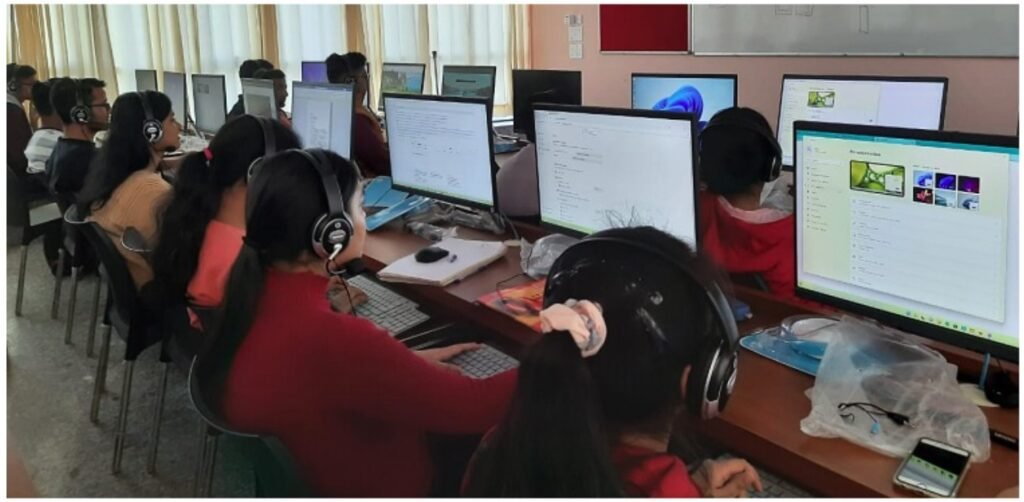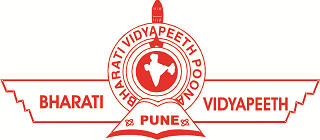 Educators: Dr VANDITA SHARMA
Educators: Dr VANDITA SHARMA
Lab Assistant: Mr. Vijay
Language Lab of Communication Skills
Program Objectives: To develop personality and communication competence in prospective engineers so that they can exchange information as well as thoughts and ideas with clarity and precision. These lab activities will enhance students’ communication skills with a focus on improving their oral communication both in formal and informal situations. Students will develop confidence in facing interviews and participating in group discussions which have became an integral part of placement procedure of the most business organizations.
Procedure of Program: Students learn delivery of effective speech through frequent rehearsal. Through extempore and impromptu activity, they learn to express ideas quickly. Through Mock Interviews, Presentation, Group Discussions and Debate students develop mastery on verbal and non-verbal communication skills. Through reading, writing activities they glaze different strategies to make communication effective. In nutshell, four language skills: reading, writing, speaking and listening in combination with soft-skills are nurtured during the program.
| Sr. No. | Title of Lab Experiments |
| 1. | Listening and Comprehension Activities – Listening to selected lectures, seminars, news (BBC, CNN, etc.). Writing a brief summary or answering questions on the material listened to. |
| 2. | Reading Activities — Reading different types of texts for different purposes with focus on the sound structure and intonation patterns of English. Emphasis on correct pronunciation. |
| 3. | Conversation Activities— Effective Conversation Skills; Formal/Informal Conversation; Addressing higher officials, colleagues, subordinates, a public gathering; Participating in a video conference. |
| 4. | Making an Oral Presentation–Planning and preparing a model presentation; Organizing the presentation to suit the audience and context; Connecting with the audience during presentation; Projecting a positive image while speaking; Emphasis on effective body language. |
| 5. | Making a Power Point Presentation — Structure and format; Covering elements of an effective presentation; Body language dynamics. |
| 6. | Making a Speech — Basics of public speaking; Preparing for a speech; Features of a good speech; Speaking with a microphone. Famous speeches may be played as model speeches for learning the art of public speaking. Some suggested speeches: Barack Obama, John F Kennedy, Nelson Mandela, Mahatma Gandhi, Jawahar Lal Nehru, Atal Bihari Vajpayee, Subhash Chandra Bose, Winston Churchil Martin Luther King Jr. |
| 7. | Participating in a Group Discussion — Structure and dynamics of a GD; Techniques of effective participation in group discussion; Preparing for group discussion; Accepting others’ views / ideas; Arguing against others’ views or ideas, etc. |
| 8. | Participating in Mock Interviews — Job Interviews: purpose and process; How to prepare for an interview; Language and style to be used in an interview; Types of interview questions and how to answer them. |
CONTENT BEYOND SYLLABUS
| S.No | Name of Experiment |
| 1. | Interview through telephone/videoconferencing. |
| 2 | Extempore, Story Telling, Poetry Recitation. |
| 3 | Mock Situations and Role Play; Enacting a short skit. |
| 4 | Debate (Developing an Argument), News Reading and Anchoring. |
Suggested Books
Text Books:
[T1] Anna Dept. Of English. Mindscapes: English for Technologists & Engineers PB. New Delhi: Orient Blackswan.
[T2] Farhathullah, T. M. Communication Skills for Technical Students. Orient Blackswan, 2002. References Books:
[R1] Masters, Ann and Harold R. Wallace. Personal Development for Life and Work, 10th Edition.Cengage Learning India, 2012.
[R2] Institute of Electrical and Electronics Engineers. IEEE Editorial Style Manual. IEEE, n.d. Web. 9 Sept. 2009.
[R3] Sethi and Dhamija. A Course in Phonetics and Spoken English. PHI Learning, 1999.
[R4] Khera, Shiv. You Can Win. New York: Macmillan.
Reference Books:
1. Patnaik, Priyadarshi. Group Discussion and Interview Skills: With VCD. Cambridge University Press India (Foundation Books), 2012 edition.
2. Kaul, Asha. Business Communication. PHI Learning: 2009.
3. Hartman and Lemay. Presentation Success: A Step-by-Step Approach. Thomson Learning, 2000.
Note: The Communication Skills Lab should be equipped with computers, microphones, an internet connection, overhead projector, screen, sound system, audio/video recording facilities, and seating arrangement for GDs and mock interviews. The student activities may be recorded and students may replay them to analyse and improve their pronunciation, tone, expressions, body language, etc.
Traditional language lab software is not mandatory and may be used by students to practice and enhance their language competence. Such software is usually elementary in nature and are mostly based on British/American English (pronunciation, accent and expression). They should preferably be in Indian English.

